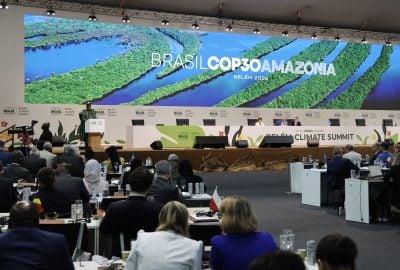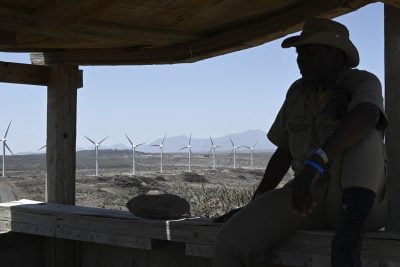Nigeria says it plans to end fuel imports by the middle of 2023, about the same time that the giant oil refinery being built by Africa’s richest man, Aliko Dangote, is expected to launch. Between the Dangote Refinery and the rehabilitation of the country’s existing four moribund refineries, Mele Kyari, group CEO of the Nigerian National Petroleum Company (NNPC), is confident Nigeria can end fuel imports by next year.
“The NNPC owns 20% equity in the Dangote Refinery. And also by right, we have access to 20% of the production from that plant. That means that whatever it does, you know we have a right to take 20% of that production as part of our equity, and this refinery will come on stream by the latest by the middle of next year,” Kyari told reporters on 30 August.
“This refinery alone, because it has a 650,000 per barrel capacity and a different technology means that it can crack the crude in a manner that you can have more gasoline than a typical refinery. That means that the refinery has the ability to produce up to 50m litres of PMS [petrol]. So the combination of that and our ability to bring back our refinery will eliminate any potential petroleum product importation into this country next year. You will not see any importation into this country next year. This is very practical. This is possible.”
Nigeria’s plans are ambitious, yet realistic
“This is a very ambitious plan which is, however, realistic,” Ayodele Oni, an energy lawyer and partner at Bloomfield law firm, says of the NNPC’s proposal.
Nonetheless, he says that several factors have to be in place. First, the government must reduce its interference in accruing revenues from petroleum products considering government shares in NNPC Ltd, and second, it must create an enabling business environment. Third, the government must commit to ending the subsidy regime that has placed a burden on its fiscal responsibilities.
According to Oni, ending fuel imports depends on several variables, including timely completion of the Dangote Refinery and rehabilitation of Nigeria’s existing refineries, as well as maintenance and proper function of the said refineries.
The Dangote Refinery has missed a number of deadlines for commencing operation and has had to move start dates forward from 2019 to 2023 due to the global coronavirus pandemic and other issues.
Technical analysts, including Joe Nwakwue, a partner at Zera Advisory & Consulting and former chairman at the Society of Petroleum Engineers, says completing the rehabilitation of the nation’s refineries could help boost local outputs and make the NNPC’s successful.
“The rehabilitation of the refineries is ongoing. Hopefully, Port Harcourt will be completed next year and start producing PMS for the local market,” he tells African Business.
He notes that “it is important to realise that even when all NNPC refineries are up and running, we will still have a PMS supply shortfall in excess of 40m litres per day which must be imported from Dangote or from outside Nigeria. This implies that significant refinery capacity expansion and investment are urgently required to fill the gap. I hope NNPC will partner with some local refinery project promoters to help derisk and actualise those projects as quickly as possible.”
The fact that Nigeria has spent about $25bn on maintenance and rehabilitation of its state-owned refineries over the past 25 years but still suffers poor performance is not inspiring confidence, says Joachim MacEbong, senior analyst at SBM Intelligence.
“No one who has followed the sector can forget the theatre that was turnaround maintenance [where facilities are shut down for maintenance] under former President Goodluck Jonathan’s administration, but perhaps, with the NNPC adopting a more commercial inclination, the incentives might be different now.”
However, Oni says a total end to petrol importation could be successful if the refineries “function at their best capacity and are properly maintained. The national-owned refineries are expected to produce 18m litres daily of PMS, while the Dangote Refinery is expected to produce 50m litres daily of PMS. With the combined product of 68m litres of PMS daily after rehabilitation, a total end to PMS importation is expected to be successful.”
Implications of ending Nigeria’s petrol imports
“When fuel importation ends, it is expected that the fuel subsidy will be removed, considering indigenous production and slightly cheaper price of petroleum products,” says Oni.
Nigerian finance minister Zainab Ahmed said recently that the government spends an average of N18.39bn ($42.9m) daily on fuel subsidies, higher than funds earmarked for health, infrastructure, and education, and could spend up to N6.72 trillion ($15.7bn) next year if it keeps a fuel subsidy in place.
Ending subsidies could mean that petrol prices soar, but Oni believes the increase will be “slightly less than what it would have been if we were to remove the subsidy and still import our petroleum products”.
“The cost of shipping, insurance and around five cost-heads will be taken off, and we could see a 20% reduction when compared to what the prices would have been without the removal of subsidy. As of February 2022, NNPC reported that N861bn was spent between July 2019 and August 2021 as freight costs on the importation of petroleum products.
“Thus, the country spends at least N26 [$0.6] as freight cost on every litre of petroleum product imported into the country. Consequently, upon local/domestic production of petroleum products, it is expected that the petroleum products should be lower than the actual current landing cost.”
He also says he expects pressure on the naira to reduce given the reduction in US dollars used for imports.
“Although the federal government of Nigeria has been using the Direct Sale, Direct Purchase arrangement for petroleum products importation, there is still a margin and additional USD spend. Hence, stopping importation will be a fantastic idea in reducing the rate at which the naira depreciates,” he says.
Nigeria moves to deal with oil theft
MacEbong believes that to succeed at ending fuel imports, Nigeria must tackle its oil theft problems.
“Oil theft puts Nigeria in a difficult position… In essence, for as long as this level of theft remains, ending fuel imports next year is not feasible,” he says.
Rampant theft and vandalism cost the country at least 9m barrels in the first quarter of the year, amounting to $1bn in lost revenue.
Gbenga Komolafe, head of the Nigerian Upstream Petroleum Regulatory Commission, said in a July press statement that of the 141m barrels of oil produced in the first quarter of 2022, only about 132m barrels were received at export terminals. To curtail oil theft, Kyari has said the country will implement a security infrastructure similar to that of Saudi Arabia’s Aramco to protect its oil pipelines, which will be unveiled soon.
“This trend poses an existential threat to the oil and gas sector and, by extension, the Nigerian economy if not curbed,” Komolafe said.
Want to continue reading? Subscribe today.
You've read all your free articles for this month! Subscribe now to enjoy full access to our content.
Digital Monthly
£8.00 / month
Receive full unlimited access to our articles, opinions, podcasts and more.
Digital Yearly
£70.00 / year
Our best value offer - save £26 and gain access to all of our digital content for an entire year!
 Sign in with Google
Sign in with Google 



